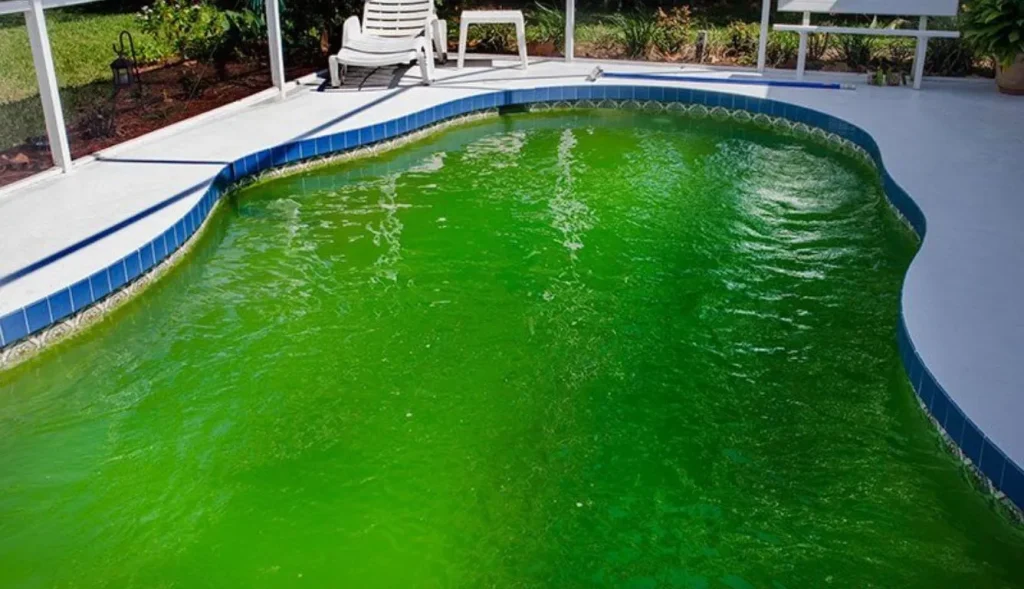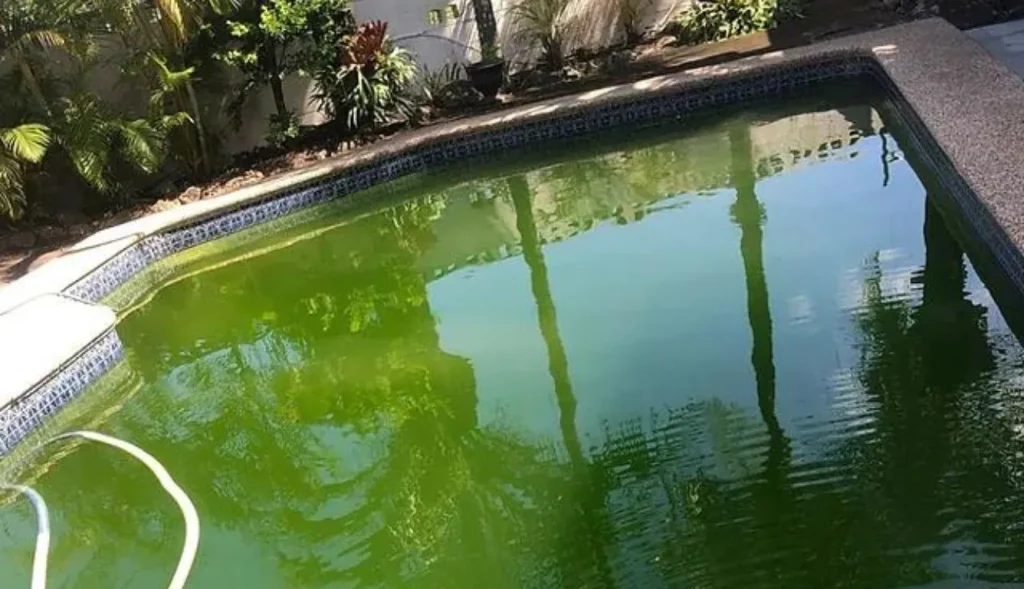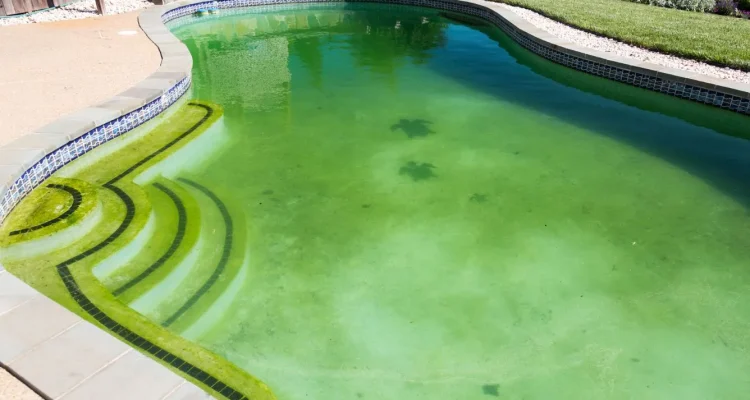Introduction
Ever looked out at your pool only to find it has turned an alarming shade of green? It’s a common issue that many pool owners face, and it’s usually a sign that something isn’t right with your pool’s chemistry or maintenance. Addressing a green pool promptly is crucial to keeping your swimming environment safe and enjoyable.

Understanding Pool Algae
What Is Pool Algae?
Pool algae are microscopic organisms that can turn your once-clear pool water into a murky green mess. These tiny organisms thrive in warm, sunny conditions, which can make them a common problem in many outdoor pools.
Different Types of Algae
- Green Algae: The most common type, green algae, causes the water to appear green and can form slimy patches on pool surfaces.
- Yellow Algae: Also known as mustard algae, this type has a yellowish hue and is resistant to typical chlorine levels.
- Black Algae: This type appears dark and is the most difficult to remove, often requiring specialized treatments.
Causes of Green Pool Water
Inadequate Sanitization
Low Chlorine Levels
Chlorine is the primary sanitizer for pools, and if the levels are too low, algae can quickly proliferate. Regularly check and maintain proper chlorine levels to avoid this issue.
Improper pH Balance
The pH level of your pool water affects the efficiency of chlorine. If the pH is too high or too low, chlorine might not be as effective, leading to algae growth.
Poor Filtration
Issues with the Pool Pump
The pool pump circulates water and ensures even distribution of chemicals. A malfunctioning pump can lead to poor water circulation and stagnant areas where algae can thrive.
Dirty or Clogged Filters
Filters are crucial for trapping debris and contaminants. If your filter is clogged or dirty, it can’t do its job properly, leading to an increase in algae growth.
Environmental Factors
Heavy Rainfall
Heavy rain can introduce contaminants and debris into your pool, which can disrupt the chemical balance and create an environment conducive to algae growth.
Debris Accumulation
Leaves, twigs, and other debris can promote algae growth if not regularly cleaned out. These organic materials can serve as a nutrient source for algae.
Algae Bloom
Types of Algae Causing Green Water
Green algae are often the result of a bloom, where conditions are perfect for rapid algae growth. This type of algae is typically the most common cause of green pool water.
How Algae Proliferate
Algae reproduce quickly, especially in warm, sunny conditions. They spread through the water and attach to pool surfaces, making the problem worse if not addressed promptly.
Diagnosing the Problem
Testing Water Chemistry
The first step in diagnosing why your pool is green is to test the water. Use a pool test kit to check chlorine levels, pH, alkalinity, and other important metrics.
Inspecting Pool Equipment
Check the pool pump, filter, and other equipment for any issues that could be affecting water circulation and filtration.
Checking for Visible Algae Growth
Look for visible signs of algae on the pool walls, floor, and surface. This can help determine the extent of the problem and guide your treatment strategy.
Immediate Solutions
Shock Treatment
What Is Pool Shock?
Pool shock is a high dose of chlorine used to kill algae and other contaminants quickly. It’s an effective way to address a green pool.
How to Apply Shock Treatment
Follow the manufacturer’s instructions for adding shock to your pool. Typically, you’ll need to dissolve the shock in a bucket of water before pouring it into the pool.
Brushing and Vacuuming
Effective Techniques for Removing Algae
Brushing the pool walls and floor helps loosen algae from surfaces, while vacuuming removes it from the water. Both steps are crucial for a thorough cleanup.
Cleaning the Filter
Steps to Clean a Pool Filter
A clean filter is essential for effective water circulation and filtration. Depending on your filter type, cleaning may involve backwashing, hosing off, or replacing filter cartridges.
Preventive Measures
Regular Maintenance
Importance of Routine Checks
Regularly checking and maintaining your pool’s chemistry and equipment can prevent green water and other issues. Stick to a consistent maintenance schedule to keep your pool in top shape.
Recommended Maintenance Schedule
Perform weekly tests of your pool water, clean the filter monthly, and ensure that the pool pump is working properly. Seasonal maintenance is also important.
Proper Pool Chemistry
Balancing Chlorine, pH, and Alkalinity
Maintaining the right balance of chlorine, pH, and alkalinity is crucial for preventing algae growth. Use a test kit to monitor these levels and make adjustments as needed.
Pool Covers and Cleaners
Using Pool Covers to Prevent Debris
A pool cover can help keep debris out of your pool, reducing the risk of algae growth and making maintenance easier.
Choosing the Right Pool Cleaner
Invest in a good quality pool cleaner that suits your pool’s size and shape. This will help keep your pool clean and free from debris that can promote algae growth.
When to Call a Professional
Signs That You Need Expert Help
If your pool remains green despite following all the steps, it may be time to call a professional. Persistent algae problems or equipment issues can be complex to resolve on your own.
How Professionals Handle Severe Algae Problems
Professionals have access to specialized equipment and treatments that can address severe algae infestations and restore your pool to a clean and safe condition.
FAQs
- How often should I test my pool water?
- Test your pool water at least once a week to ensure proper chemical balance and prevent issues.
- Can I swim in my pool if it’s green?
- It’s best to avoid swimming in a green pool as it may contain harmful bacteria and algae.
- What are the best products for algae control?
- Look for high-quality pool shock and algaecides specifically designed for your pool type.
- How do I prevent algae from returning?
- Maintain proper chemical balance, clean your pool regularly, and use a pool cover to minimize debris.
- How long does it take to clear up green pool water?
- Depending on the severity of the algae problem, it can take anywhere from a few days to a week to clear up green pool water with proper treatment.

Conclusion
Dealing with a green pool can be frustrating, but with the right knowledge and tools, you can resolve the issue and keep your pool in great shape. Regular maintenance, proper chemical balance, and timely interventions are key to preventing and managing green water. Enjoy a clear and inviting pool with these effective strategies!


Congratulation!